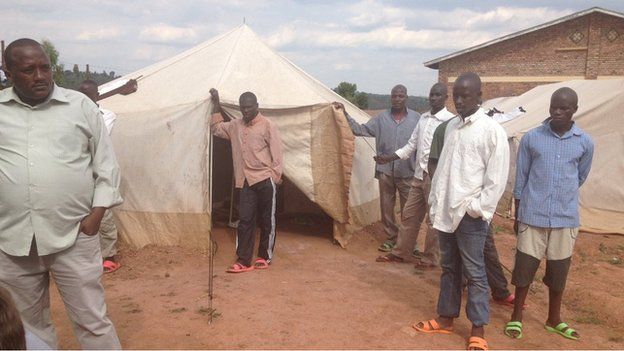Rwanda 'protecting M23 DR Congo rebels'
- Published

The Democratic Republic of Congo has accused Rwanda of "protecting" M23 rebel leaders wanted for war crimes.
A government official told the BBC that seven months after the end of the rebellion, Rwanda was also delaying attempts to interview about 500 ex-fighters currently in a camp in Rwanda.
Some 800,000 people fled their homes in eastern DR Congo during the insurgency.
Rwanda has long denied that it supported the rebels and says it is co-operating with DR Congo's requests.
The M23 took up arms in eastern DR Congo in April 2012, accusing the government of marginalising the ethnic Tutsi minority and failing to honour previous peace accords.
Following their defeat at the hands of the Congolese army and a UN brigade in November 2013, former fighters gathered in camps in neighbouring Rwanda and Uganda.
At the scene: Maud Jullien, BBC Africa, Rwanda
It was surprisingly easy to find the camp in the town of Ngoma, in eastern Rwanda - far from the Congolese border.
When we arrived, dozens of young men were gripping onto the camp's fence - peering outside onto the road.
After more than a year in the camp, most of them say they are fed up with the wait, and want asylum in Rwanda. Despite DR Congo's offer of amnesty, they don't feel it is safe to return.
Inside, the camp looked quite neat and peaceful. A garden, a few red buildings and a stretch of large white tents, where the former rebels sleep in groups of six.
They cook for themselves in an outdoor kitchen. They only leave the camp to go see a doctor, but they are allowed to keep their mobile phones.
On the whole, it seems like a comfortable camp - certainly not a prison. Officials tell me more than 100 of them have run away since they arrived 15 months ago.
The group's former leader Jean Marie Runiga has no intention of leaving. Despite being accused of war crimes and crimes against humanity in DR Congo, he is requesting asylum in Rwanda. He is hosted in a house outside the camp, which he told me was very comfortable.
The subsequent peace accord stipulated that former fighters would be granted an amnesty on their return to DR Congo - and leaders of the group should be returned to face charges of war crimes and crimes against humanity.
But Francois Muamba, who works for DR Congo's government to ensure regional peace and security, has accused Rwanda of dragging its feet over these promises, to contrast to Uganda.
He said Rwanda was "protecting" four wanted M23 leaders, but DR Congo did not want to press the issue as it was "not looking for war" with its neighbour.
All four are under UN sanctions.
Attempts by Congolese officials to interview former fighters about their return to DR Congo had not been authorised by the Rwandan authorities, he said.
"I am speculating that this is because we will discover that about 70% of former combatants are Rwandan, not Congolese," Mr Muamba told the BBC.
"They could also be keeping these people as a means of pressure," he said.
Rebels in DR Congo
- The M23 has been DR Congo's most active group until it was defeated in November 2013
- Made up mostly of ethnic Tutsis, like Rwanda's leaders
- US and other donors have cut aid to Rwanda, accusing it of backing the M23
- Rwanda denies the charges
- At least 10 other armed groups still operate in eastern DR Congo
- They often make money by controlling the trade in the region's minerals such as gold, tin and coltan, used in mobile phones
However, Rwanda's Justice Minister Johnston Busingye told the BBC correct procedures had to be followed and that DR Congo had not yet provided the necessary documents for a transfer of the wanted M23 leaders, including the group's political leader Jean Marie Runiga.
DR Congo initially made its transfer request in July 2013 - and has not yet replied to requests for further documents.
Mr Buingye said Rwanda had a duty of care to all the former rebels as human beings.
"Were we supposed to just throw them out on to the streets? We respect international humanitarian law."
On a visit to a camp in Rwanda for former M23 rebels, the BBC's Maud Jullien said many former fighters were applying for asylum in Rwanda and did not want to go back to DR Congo.
Many people in DR Congo feel strongly that the former rebel leaders should be brought justice, our reporter says.
Eastern DR Congo has been wracked by conflict since 1994, when Hutu militias fled across the border from Rwanda after carrying out a genocide against Tutsis and moderate Hutus.
Rwanda's current government is mostly made up of ethnic Tutsis who fought against the Hutu genocidal government.
Laurent Nkunda, another Tutsi who led a rebel group in eastern DR Congo, remains in Rwanda five years after he fled there. He is officially under house arrest but there are no moves to prosecute him.